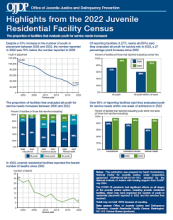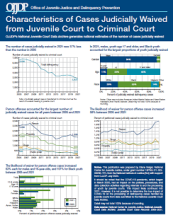Juvenile (under 18)
Child-Friendly Visits in Jail
A Study of a Statewide Safe Firearms Storage Message Campaign in Texas Schools
The Impacts of School Security Equipment on Students and Schools
Persistence and Desistance across Generations: A Longitudinal Investigation
Evaluating the Effectiveness of a Community-led, School-based Secure Firearm Storage Campaign in Michigan
The Ecology of Resilience: Examining Impacts of Service Engagement, Facility Safety, and Trauma History on Positive Life Trajectories in Justice-Involved Youth
Procedural and Structural Justice Through Causal Understanding, Component Decoupling, and Relation Characterization
A National Review of Multidisciplinary Teams addressing Child Sexual Exploitation
Collaborative Strategies in Safeguarding Children: A Community-Centric Approach to Overdose Response
Leisure Risk for Youth on Probation: How it Relates to Recidivism and How Probation Officers Address it in Case Planning
Assessing the Implementation and Impact of Restorative Practices within a Multicomponent School Safety Approach
Evaluating Virtual Reality Enhancements of an Evidence-based Multi-tiered Aggression & Bullying Prevention Program
A Multi-District Analysis of School Safety in School Districts Awarded STOP School Violence Grants in Fiscal Years 2018–2023
Intergenerational Legal System Involvement Among Juvenile Justice-Involved Females and Their Offspring: Opportunities for Prevention
National Juvenile Court Data Archive
The Youth Protective Factors Study: Risk, Strengths, and Reoffending
Expansion of University of South Florida's BRIGHT Project to Combat Human Trafficking
Safe Transitions for Teens
Five Things About Youth and Delinquency
Highlights from the 2022 Juvenile Residential Facility Census
Characteristics of Cases Judicially Waived from Juvenile Court to Criminal Court
Redesigning Life in U.S. Prisons
The prison system in the U.S. typically places a heavy emphasis on security, control, and punishment, and this foundation can create an adversarial culture within correctional facilities — incarcerated individuals versus correctional staff. But what if that culture could change? What would it look like? How would it impact not only incarcerated individuals but also correctional officers and other staff?





